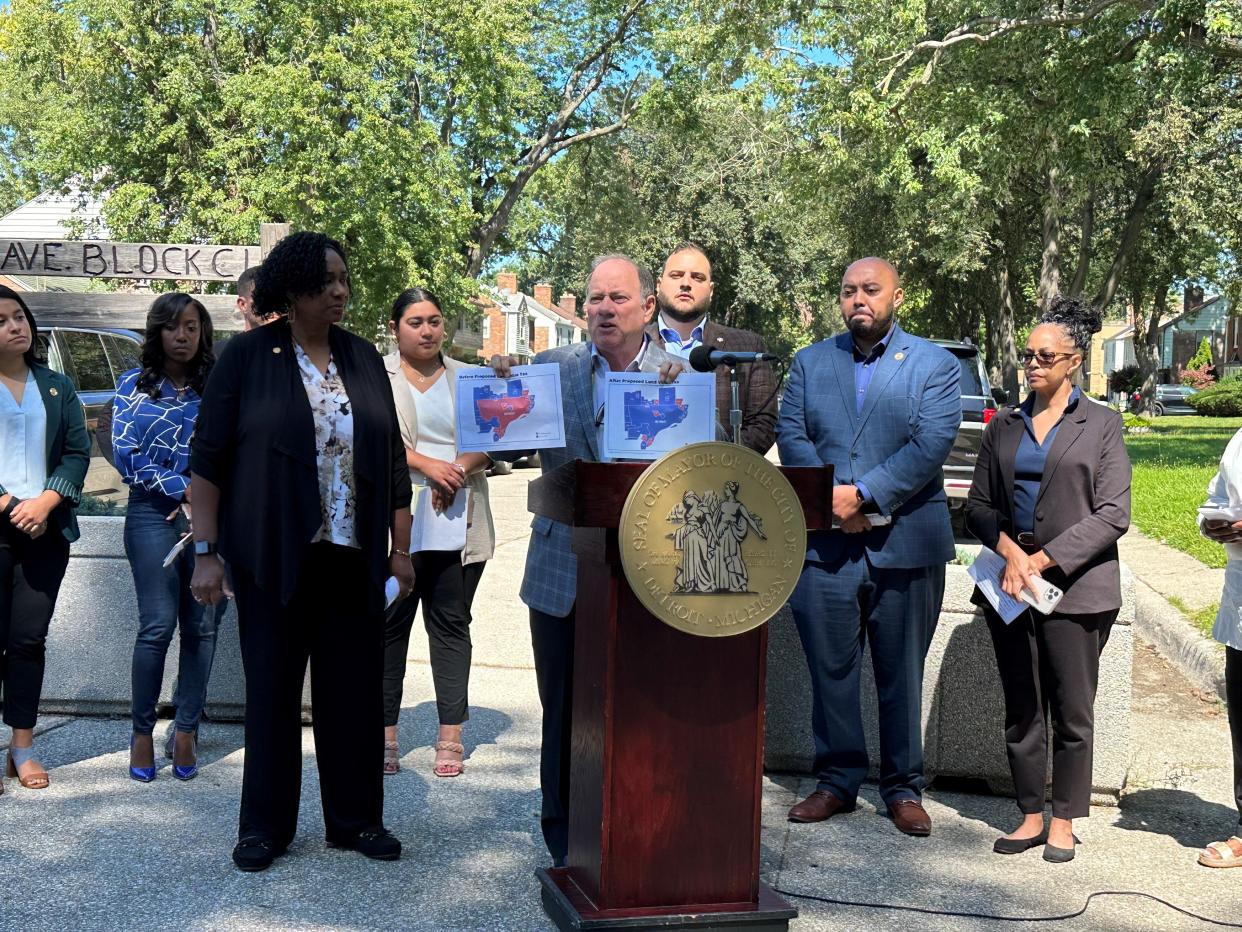Detroit property tax cut proposal to be introduced to Michigan lawmakers next week

- Oops!Something went wrong.Please try again later.
City officials on Thursday unveiled the proposed Land Value Tax plan, which promises to cut Detroit homeowners' property taxes by nearly 20% and is to be introduced to state lawmakers next week.
The Land Value Tax plan would cut property taxes by about 17% for 97% of homeowners starting in 2025 if voters approve the proposal next year, Mayor Mike Duggan, state Rep. Stephanie Young, D-Detroit, and other state and city lawmakers announced Thursday in Rosedale Park. Young plans to introduce the plan next week to the Michigan Legislature. If the plan is ultimately approved, Detroit would have a property tax rate comparable to nearby cities like Southfield, Warren, Grosse Pointe, Ferndale and Oak Park, Duggan said.
"There are far too many people who are speculating on land leaving it vacant; far too many people who own abandoned buildings and leave them there and far too many people just sitting on their land, not developing it. When we raise the taxes a little more than double, we will start to create incentives for them to improve their property," Duggan said.
Duggan initially unveiled the proposal to cut taxes on properties with buildings and improvements, and raise taxes on vacant land to incentivize development and prevent blight, during last spring's annual policy conference on Mackinac Island. Since then, the plan has undergone a few changes, including more than doubling taxes on land from 85 to 189 mills, cutting tax on structures and improvements by 14 mills, and rather than phasing it in over three years, the cut would take immediate effect in 2025 if voters approve it on the ballot.
"For far too long, Detroiters have seen blighted property owners get a pass on paying their fair share of property taxes, giving them no incentive to improve their property," Young said.
Those who would be hit the hardest include land speculators who own vacant lots across the city, owners of empty and derelict buildings, scrapyards and auto salvage yards in the city and parking lot owners. The average vacant lot in Detroit pays about $30 a lot but under the plan, the average would reach $67 per lot. Urban farms, community gardens and owners of four or fewer side lots are deemed community spaces and will not be affected by the proposed plan.
Residents who have Neighborhood Enterprise Zone (NEZ) property tax breaks, which last 15 years, would be able to choose between keeping the NEZ or the Land Value Tax reduction. The NEZ abatement is about a 15%-20% reduction, according to the city. Once the exemption expires, those homeowners will receive the permanent 17% Land Value Tax reduction. Duggan said 90% of Detroiters pay 67 mills while the remainder pay 53 mills, a policy which the mayor said is "unfair" and will be phased out.
"The Land Value Tax offers the same tax break to all homeowners, regardless of which neighborhood they live in,” Duggan said.
Dozens of residents had mixed feelings about the plan. Pam Weinstein, a Rosedale Park resident, said it would affect many people and questioned when the city has ever lowered its taxes.
"I can't imagine that Duggan would propose something that would put us back into bankruptcy," Weinstein said. "I kind of have a wait and see; it almost sounds too good to be true. I'm a little skeptical, but it sure sounds great."
Ben Washburn, a former legal counsel for the Wayne County Board of Commissioners and former Detroit school board member, called it a positive plan that would be a modest improvement for residents.
"Having a tax burden that's comparable to the (suburbs) around us is important," Washburn said.
Several protesters from the Coalition for Property Tax Justice were not convinced by Duggan's plan. Bernadette Atuahene, a property law scholar who has studied Detroit's property tax foreclosure crisis, urges the administration and City Council to, first, pass a property tax reform ordinance to ensure homeowners are not being overassessed.
"We're not against (the Land Value Tax plan). What we're what we're saying is you must pass the property tax reform ordinance first to clean up the assessment division, which is currently still doing these over-assessments before we implement the Land Value Tax plan," Atuahene said. "It gives no-nonsense solutions to cleaning up the problems in the assessment division."
The proposal will undergo state approval, followed by Detroit City Council putting the tax question out to Detroit voters. Duggan aims to have it on the Feb. 27 ballot for the Michigan presidential primary. Details about the proposal are available online.
Dana Afana is the Detroit city hall reporter for the Free Press. Contact Dana: dafana@freepress.com or 313-635-3491. Follow her on Twitter: @DanaAfana
This article originally appeared on Detroit Free Press: Detroit Land Value Tax plan to be introduced to Michigan lawmakers

